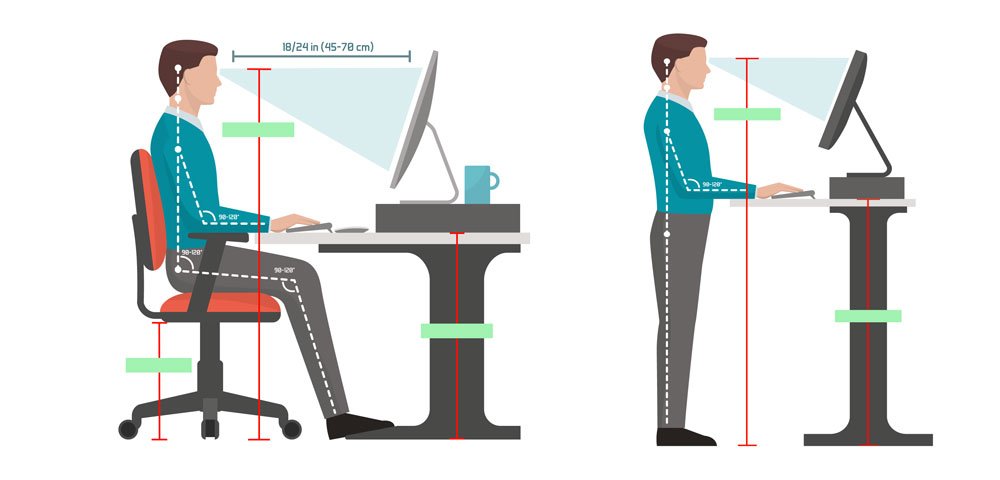Office Work and Back Pain: Why a Third of UK Workers Are Affected and What You Can Do About It
Office workers make up one of the largest professional demographics in Cardiff. In fact, statistics show that nearly 1 in 3 office workers in the UK experience back pain during their careers. This is a staggering figure, and it highlights just how widespread the problem has become in our modern working culture.

For many, pain doesn’t start overnight. It often builds slowly over time, creeping in after months or even years of repetitive tasks, long hours at a desk, and stressful working conditions. Pain becomes the “final straw” that prompts people to seek care. But the truth is, the warning signs appear long before the pain does.

Does this sound familiar?
- Neck tension or stiffness?
- Recurring headaches?
- Lower or upper back pain?
- Eye strain or pressure in the face?
- Fatigue or difficulty concentrating?
- Muscle spasms?
- Wrist or shoulder pain?
- Pins and needles in the arms or hands?
- Low mood and irritability?
- Poor sleep quality?
- Heightened stress levels?
If you’re an office worker in Cardiff (or anywhere in the world), chances are you’ve experienced at least one of these symptoms. And you’re not alone. These issues plague millions of people who spend their working lives behind a desk. The good news is that understanding the root causes can help prevent and alleviate them.
Why Office Work Leads to Pain
Pain isn’t random. It’s the result of a combination of physical, environmental, and lifestyle factors. Here are some of the biggest culprits:
1. Long Hours Sitting
Human beings are not designed to sit for long periods. Our bodies evolved for movement – walking, standing, bending, and stretching. Sitting for eight (or more) hours a day places unnatural strain on the spine, hips, and muscles. Over time, this leads to stiffness, reduced mobility, and eventually lower back pain.
2. High Workload and Stress
Deadlines, long hours, and the pressure to climb the career ladder all contribute to physical tension and mental stress. Stress alone can increase muscle tightness, especially in the neck and shoulders, which then leads to discomfort and headaches.
3. Poor Workstation Ergonomics
Not all office setups are created equal. Many desks, chairs, and monitor placements simply aren’t designed for prolonged, healthy posture. Something as simple as a poorly positioned keyboard can lead to wrist pain or shoulder issues, while a low monitor can cause you to crane your neck forward, creating long-term spinal problems. You can read more about workplace posture advice from the British Chiropractic Association.
4. Lifestyle Factors
Our work is only one piece of the puzzle. Poor sleep, lack of hydration, unhealthy diets, and high levels of external stress (from family, bills, or relationships) all amplify physical pain and reduce the body’s ability to recover.
5. Lack of Exercise
Regular movement is essential for a healthy spine and musculoskeletal system. Many office workers don’t get enough exercise to counteract the hours of stillness at their desks. This inactivity can weaken muscles, reduce circulation, and increase the risk of stiffness and injury.
6. Mental Health
Studies show that people with anxiety and depression often experience higher levels of physical pain. The mind and body are deeply connected, and when mental wellbeing is affected, physical symptoms often follow.
7. Old Injuries
Previous injuries can flare up in office environments. An old back injury, for example, may be aggravated by long hours sitting in the wrong type of chair, while a shoulder injury might resurface after months of poor desk posture.
The Bigger Picture: Why Pain Is Just the Tip of the Iceberg
When office workers come to see me, pain is usually the main reason. But pain is only the final part of a much larger puzzle. By the time discomfort sets in, the body has already been coping with stress for months or even years. Muscles adapt, joints stiffen, and nerves become irritated long before pain signals fire. This is why it’s so important to take preventative action, rather than waiting until things become unbearable.
Practical Steps for Office Workers to Reduce Pain
So, what can office workers in Cardiff (and beyond) do to reduce pain, protect their bodies, and work more comfortably? Here are some simple but powerful strategies:
1. Rethink Your Workstation
- Ensure your monitor is at eye level, so you don’t have to bend your neck.
- Adjust your chair so your feet rest flat on the floor, with your knees at a 90-degree angle.
- Position your keyboard so your wrists remain straight, and your arms are at or just below elbow height.
- Use an ergonomic chair that supports the natural curve of your spine. See the HSE guide on musculoskeletal disorders for workplace ergonomics tips.
2. Move More
- Take short breaks every 30–60 minutes.
- Stand up, stretch, and walk around whenever possible.
- Consider a standing desk or alternating between sitting and standing throughout the day.
- Even small movements (rolling your shoulders, turning your head side to side, or stretching your wrists) can make a difference.
3. Manage Stress
- Practice relaxation techniques such as deep breathing, mindfulness, or meditation.
- Break large tasks into smaller, manageable steps.
- Set realistic goals for each day to avoid burnout.
4. Prioritise Lifestyle Habits
- Drink plenty of water throughout the day.
- Get 7–9 hours of quality sleep each night.
- Fuel your body with balanced, nutritious meals.
- Schedule regular exercise – even a brisk 20-minute walk can help counteract hours of sitting.
5. Pay Attention to Mental Health
- Acknowledge stress, anxiety, or low mood and seek support if needed.
- Consider counselling, stress-management workshops, or talking openly with friends and family.
- Remember: mental and physical wellbeing go hand in hand.
6. Seek Professional Help
If you already experience persistent pain, don’t ignore it. Chiropractic care, physiotherapy, massage therapy, and other professional treatments can help relieve pain, restore mobility, and prevent further injury. The NHS also offers resources on back pain that can be a good starting point.

The Takeaway for Office Workers in Cardiff
Back pain and other musculoskeletal issues are not just inconveniences – they can significantly affect quality of life, productivity, and overall wellbeing. But they are not inevitable. By making small changes to your daily habits, improving your workstation ergonomics, and seeking professional support when needed, you can greatly reduce your risk of pain and discomfort.
At The Cardiff Chiropractor, we help office workers every day who are struggling with pain, tension, and fatigue caused by their working environment. Whether you’re dealing with headaches, back pain in Cardiff, or pins and needles in your arms, there are solutions available – and they can make a huge difference to your daily life.
For more details on the treatments we provide, visit our chiropractic services page or book an appointment today.
Final Thoughts
Office work is here to stay, and while it brings many opportunities, it also presents new challenges for our health. Recognising the risks and acting early can prevent years of discomfort. Remember, pain is often the last stage in a much longer process. Don’t wait until it becomes unbearable – take steps today to support your body and mind.
If you’re an office worker in Cardiff and you’ve noticed some of the symptoms we’ve discussed, reach out and take the first step towards feeling better. Your future self will thank you.


